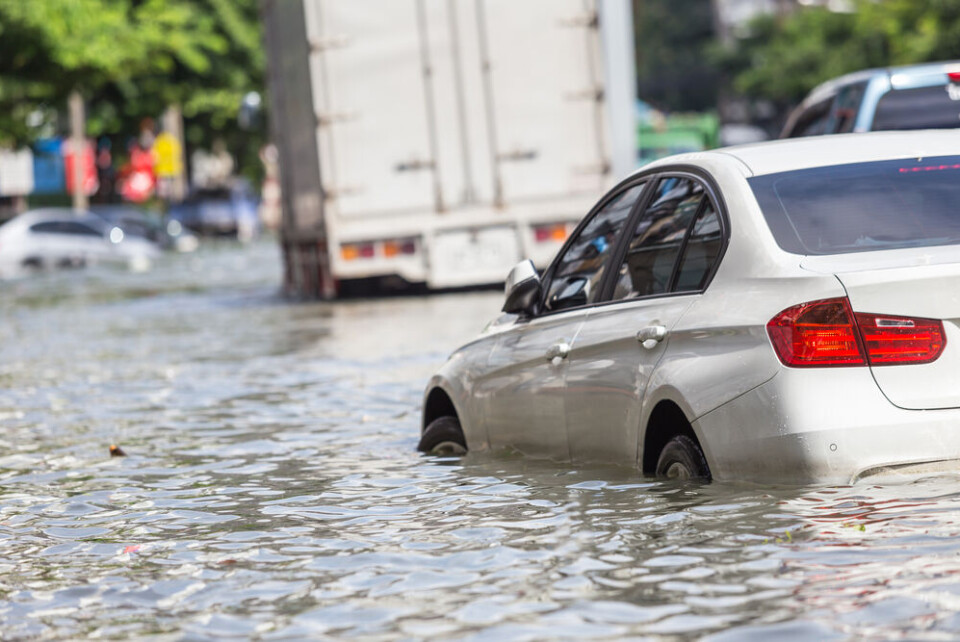-
What to expect from the weather in France for the long Easter weekend
Outdoor eggs hunts set to be marred by rain, and in the south by thunderstorms
-
Briton, 27, dies in avalanche as heavy snow covers Alpine resorts
He was swept away by fifteen metres of snow as he stood by side of road
-
Photos: Northern Lights dazzle Normandy skies
Coloured hues were also snapped in some areas of Brittany, with activity peaking before midnight
What to do (and not do) during heavy rain and flood alerts in France
The French government has instructions to help people stay safe

The French official weather forecaster Météo France operates at four levels of alert for storms:
Green: No danger
Yellow: Be vigilant if you are planning outdoor activities
Orange: Be careful when out of the home, dangerous weather is expected, cancel plans outdoors if possible
Red: Extreme vigilance required, exceptionally dangerous weather is expected
If a red alert situation is declared, it is likely that you will also receive an alert through your mobile phone’s emergency text service, informing you of all necessary precautions.
The government has issued instructions on what to do if you are informed of a sudden flood.
Stay indoors
It may seem obvious, but in the event of a severe storm warning, you should stay inside. Work from home if you can, and postpone any trip whether by foot or car.
Do not rush to pick-up your children at school
If you receive an emergency alert on your mobile phone, you should not go to pick up your children at school.
Schools are fully equipped to deal with natural disasters, whether floods, tornadoes or an earthquake. All classrooms have emergency supplies, and teachers and students are drilled every year to practise safe evacuation procedures.
The rescue services may be hindered by parents gathering in front of schools with their cars in dangerous conditions. Your children will be taken care of by staff, which includes nurses.
That is why you should not go to pick-up your children, unless explicitly asked by authorities.
Make your home as safe as possible
If you can, avoid ground floor or underground areas. Staying elevated makes you safer in the event of a flood. Stay away from windows as hail, strong winds or falling objects may break them.
Turn off gas, electricity and ventilation, lock all doors and windows, reinforcing gaps with tape or fabric if needed.
Read also: France storm warnings continue: tips on how to secure your property
Do not drive
Only a few centimetres of water can make you lose control of your car. Strong currents can also prevent you from opening your car door.
Read also: Vehicles, homes: claiming compensation for weather damage in France
Stay away from water and trees
Waterbanks become very hazardous during storms, as the ground gets muddy and slippery. Water levels can also rise abruptly.
If you hear thunder, then you should also avoid hiding under trees, especially if they are the highest point around. In dense cities, most tall buildings are equipped with lightning rods.
Stay informed and communicate with friends and family
Keep your phone charged but try to avoid phone calls so as to not flood the lines. Emergency services will be needing them, so use text and messaging apps if you can.
Use text messaging to stay in touch with friends and family, making sure they are safe. If you are aware of vulnerable or elderly neighbours, check-in on them however you can and make sure they are safe too.
Local government will be communicating through your phone’s emergency text service. In the event of natural disasters, only leave the safety of your home when invited to.
If already in a car
If you get caught by a storm or a flood while driving, park on the side of the road away from slopes, trees and pylons. Then turn on hazard lights and call emergency services, either sapeurs-pompiers at 18 or the European emergency number at 112.
Read also
Photos: giant hail, floods, a tornado in Normandy as storms hit France
How will weather be in my French town in 2050? New tool helps find out
























